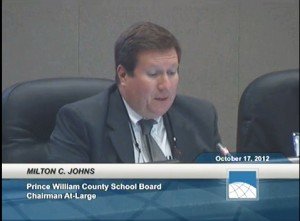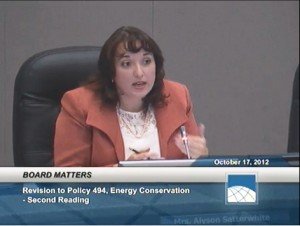
If all the regulations that comprise the School Division's Revised Energy Conservation Plan are implemented, air conditioners will be shut off when students leave school buildings at the end of the day and teachers will not be allowed to use personal appliances in classrooms.
However, at the Oct. 17 Prince William County School Board meeting, Chairman At-Large Milt Johns proposed "a friendly amendment" to the policy to address the concern of board members and educators over the implementation of the policy.
"Listening to some concerns that board members have raised, I don't think that at this point the Board needs to kind of micromanage the regulations. However, there is a concern that the Board express intent and be very clear with its intents, so its policies are actually followed," Johns said.
The School Board voted unanimously (7 yes, 1 absent) to approve the revised Energy Conservation policy.
Throughout the meeting, Associate Superintendent for Finance and Support Services David Kline stipulated that the overarching policy was up for action, not the individual regulations, which would include items such as classroom climate settings, personal appliances and mandates regarding the opening of windows. However, some of the recommendations were very specific, such as the suggestion that "the optimal temperature for cognitive thought is 74 degrees."
Yet, it was the suggestion that teachers give up their personal appliances, such as refrigerators or coffee makers, that spurred the most concern. The controversial regulation states, "Appliances for personal convenience (e.g. fans, personal coffee makers, personal refrigerators, etc.) are prohibited without prior approval from the Administrative Coordinator, Energy Management. Use of school Division appliances provided in lounge areas and break rooms is encouraged."
Prince William Eduction Association President Jim Livingston raised an objection that a specific section of the plan, 494-1 J is harmful to county educators. While Livingston said he, "applauds efforts at energy conservation." He had extreme concern that the word "prohibited" was attached to the use of appliances not provided by the school district. He questioned whether the schools' appliances would be sufficient for use by entire staffs.
Kline responded to such concerns, suggesting board members, teachers and citizens look at the policy in terms of the bigger picture.

"In a general sense, we are very much starting a journey here of getting to effective energy management and conservation. Our goal is certainly to save energy and our expectation is that we will save millions of dollars in doing so. Knowing that at the same time, we have to have an effective process, so not having an impact on instruction," Kline said. "It's not changing truly what we are doing out there, so it's still a start-up process; there are a number of factors we have to look at."
Kline expressed the need to be flexible with individual teachers. By the same token, he urged teachers to begin to solve energy problems on a building-wide level, rather than everyone bringing in their personal appliances.
Board member Alyson Satterwhite of the Gainesville District brought up various concerns, regarding the Energy Conservation Policy, such as the need for women who are breastfeeding to have access to refrigerators. She also questioned whether there would be enough time during teachers' lunches and planning periods for everyone to use communal appliances and the effect of leaving doors and windows open when many students suffer from allergies.
"We've been addressing allergies with the EpiPen this year. When we talk about opening doors, we are talking about letting in pollen. Once pollens get inside, we're talking about taking them throughout our HVAC systems and spreading them to our students," Satterwhite said.
These concerns prompted Johns to propose an additional amendment to the policy that would allow school administrators flexibility in interpreting and responding to recommendations from the energy coordinators, stating, "All decisions in relation to the implementation of this policy should be firmly grounded in common sense."
Occoquan District Board member Michael Wooten requested the additional statement be added, which reads, "nothing in this policy shall be construed to deny reasonable accommodations."
Support Bristow Beat - Donate Today!